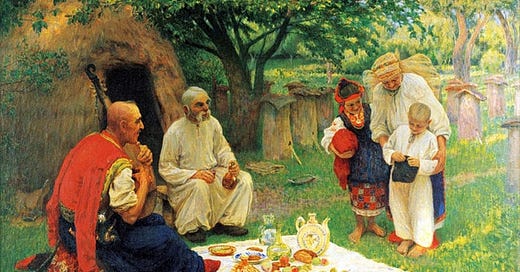Have you included the metabolic deaths due to MDs lack of nutritional education? (Twitter)
There is much confusion in the United States about the purpose of medical education - it is not cooking pancakes. Historically, physicians attended to the sick with the goal of curing disease and alleviating suffering. They did not compile daily menus. In every culture, people came up with ways of keeping themselves well by figuring out what was edible, where to find it, how to prepare it, when to eat it, and in what proportions. A physician knew that as a member of the community not because of any special education.
Many people are sick and die miserably because they delegated their individual and communal duty to keep themselves well to experts. Experts are guilty of disrupting local food cultures and traditions. As are the people who followed foolish ways of eating according to expert advice. The sooner you realize it is up to you to know what to eat, the better off you will be. If you are a physician who deludes himself by thinking you can know what a stranger you see for the first time in your life should eat, forget you ever had that embarrassing idea. The best you can do is figure out what you should and shouldn’t eat yourself.
“Doctor, what should I eat?” is a stupid question you should not ask. If are a physician facing this question, the only answer to it is “I cannot know it. It is something for you to know.”
All traditional cultures derive their hygienic function from this ability to equip the individual with the means for making pain tolerable, sickness or impairment understandable, and the shadow of death meaningful. In such cultures health care is always a program for eating, drinking, working, breathing, loving, politicking, exercising, singing, dreaming, warring, and suffering. (Ivan Illich. Medical Nemesis; emphasis mine)
You come from some place and belong to some people who used to have some traditions of eating and drinking. A good place to start is to figure out who your people are, what tradition you belong to, and find out what your people thought was edible and what was not. Knowing what food is and what is not food will change what you put in your mouth. You will be better off for it and will never think that someone else can know what you should eat. You will know the truth that a question “Doctor, what should I eat?” is an absurdity.
Dearly beloved!
I have called you so often and you have not heard Me.
I have shown Myself to you so often and you have not seen Me.
I have made Myself fragrance so often, and you have not smelled Me,
Savorous food, and you have not tasted Me.
Why can you not reach Me through the object you touch
Or breathe Me through sweet perfumes?
Why do you not see Me? Why do you not hear Me?
Why? Why? Why?
For you My delights surpass all other delights,
And the pleasure I procure you surpasses all other pleasures.1
Muhyiddin Ibn 'Arabi. The Theophany of Perfection. With gratitude to Muhammad Saufi for sharing this quote.
Theophany is a visible manifestation of God to mankind. What has become a torture for health and calculation of absurdities, theology preserved as the province of truth and pleasure. Hence, disease comes from ignorance. The cure is looking for truth, which is something only you can do.
Osman Yahya. Theophanies and Lights in the Thought of Ibn ‘Arabi. How knowledge arises from being within a culture and faith. It is good contrast to how knowledge is produced in a secular setting with the application of a scientific method. Do note the idea of Unity as opposed to reductionist approach in science where everything consists of parts. The article does not deal with food per se but with knowledge and truth.



